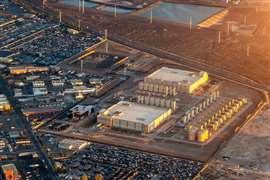Kneeland: ‘timing is right’ for RSC deal
22 December 2011

Michael Kneeland, United Rentals chief executive officer, said the timing was perfect for the acquisition of RSC Equipment Rental.
In an exclusive interview with IRN the week after the announcement, Mr Kneeland said he believed the timing worked on several fronts; "IHS Global Insight is predicting steady growth in rental in the next five years. Coupled with that we polled 2000 of our customers and 80% are expecting 2012 to be same or better than 2011. That's up from 50% a year ago. We believe we are poised for growth."
At the same time he said the US market was seeing a strategic shift towards rental, prompted by restraints on credit availability; "We're seeing a structural shift well underway in the US. We've asked a lot of our customers and they say they are renting more. We're also seeing an increase in new accounts [in a year when non-residential construction actually went down]."
He reiterated the view that United and RSC are a good strategic fit, with RSC's far greater exposure to the industrial sector providing United with a much broader customer base. After the acquisition, United's industrial business will represent around 35% of all revenues, up from the current 16%.
United said this broader customer base will give it exposure to the currently stronger industrial market and provide insurance against the cyclical nature of construction.
Mr Kneeland played down the benefits of having a much bigger market share - up from around 8.5% to 12-13% - and said those considerations were not central to the acquisition.
"The market position didn't play into it", he told IRN, "Strategically, we look at three things: strategy, culture and shareholder value." He said the two companies shared a culture and that combined they would be able to provide a better service to large customers and national accounts.
"It's about performance, being the supplier of choice", he said.
When asked if he saw opportunities for United Rentals to further consolidate the North American market, he simply noted that it was still highly fragmented and also a massive industry, approaching US$32 billion.
Could a combined branch network of 800 to 900 locations be considered mature? That would be "premature" he said, pointing to the greater intensity of depots in the UK as an example.
Mr Kneeland also said that the number of depot mergers and closures required in combining the United and RSC networks could exceed the preliminary 5-10% estimate; "it wouldn't surprise me [if it was more]."
He said the massive scale of the combined business would not be a bar to providing a high level of customer service, since both companies shared a service culture; "It comes down to the branch level. It's not what happens at Greenwich [United's HQ] or at the regional level, it's about the branch."
His message to United and RSC's customers that the combination of the two "should be the best of both worlds."
Meanwhile, in the analysts conference call that followed the acquisition announcement, Mr Kneeland and Erik Olsson, RSC's CEO, provided background on how the merger had come about.
Mr Kneeland said United contacted RSC in late October and that discussions proceeded very quickly after that. Mr Olsson said RSC had not been shopping around for a buyer and had not initiated the transaction.




